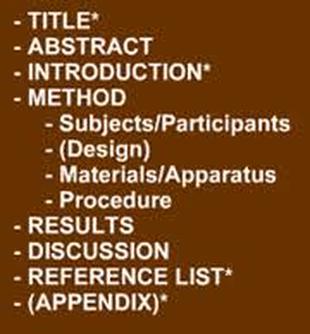
Title
- What is in it? = IV and DV
- Why is it there? = Allows the reader to very quickly identify the purpose of the report
- What is in it? = Details everything in around 250 words
- Why is it there? = Allows the reader to judge whether the article is relevant to them
- What is in it? = Background research
- Why is it there? = Introduces the topic area and prepares for peer review
- What is in it? = Enough detail about how the study was done to allow for replication
- Why is it there? = Allows people to replicate and verify the procedure
- What is in it? = Descriptive and inferential statistics
- Why is it there? = To show the results of the study
- What is in it? = Analysing the implications, applications and possible conclusions of the study
- Why is it there? = To stimulate discussion and give ideas for further research or applications
- What is in it? = All of the reading which has been referred to
- Why is it there? = To acknowledge who was read and prevent plagiarism
- What is in it? = Any materials not found elsewhere, like the consent forms
- Why is it there? = To give any further information about the study.

